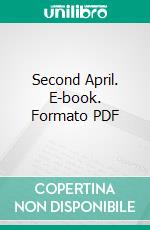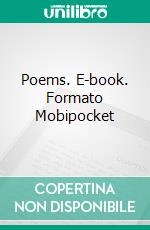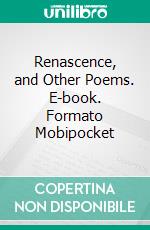Edna St Vincent Millay eBooks
eBooks di Edna St Vincent Millay di Formato Mobipocket
Second April. E-book. Formato Mobipocket Edna St. Vincent Millay - Ionlineshopping.Com, 2019 -
This is a collection of some very disturbing and depressing poems which almost seem like a cry for help in certain parts. The only redeeming part of this book, though still depressing, was the poem about a book begging to be picked up and read and not forgotten.
Poems. E-book. Formato Mobipocket Edna St. Vincent Millay - Ionlineshopping.Com, 2019 -
Throughout much of her career, Pulitzer Prize-winner Edna St. Vincent Millay was one of the most successful and respected poets in America. She is noted for both her dramatic works, including Aria da capo, The Lamp and the Bell, and the libretto composed for an opera, The King’s Henchman, and for such lyric verses as “Renascence” and the poems found in the collections A Few Figs From Thistles, Second April, and The Ballad of the Harp-Weaver, winner of the Pulitzer Prize in 1923. Like her contemporary Robert Frost, Millay was one of the most skillful writers of sonnets in the twentieth century, and also like Frost, she was able to combine modernist attitudes with traditional forms creating a unique American poetry. But Millay’s popularity as a poet had at least as much to do with her person: she was known for her riveting readings and performances, her progressive political stances, frank portrayal of both hetero and homosexuality, and, above all, her embodiment and description of new kinds of female experience and expression. “Edna St. Vincent Millay,” notes her biographer Nancy Milford, “became the herald of the New Woman.”
Renascence, and Other Poems. E-book. Formato Mobipocket Edna St. Vincent Millay - Ionlineshopping.Com, 2018 -
"Renascence" (also "Renasance") is a 1912 poem by Edna St. Vincent Millay, credited with introducing her to the wider world, and often considered one of her finest poems. The poem is a 200+ line lyric poem, written in the first person, broadly encompassing the relationship of an individual to humanity and nature. The narrator is contemplating a vista from a mountaintop. Overwhelmed by nature, and thoughts of human suffering, the narrator empathetically feels the deaths of others, and feels pressed into a grave. Friendly rain brings the narrator back to joy in life—the rebirth, or "renascence", of the title.


